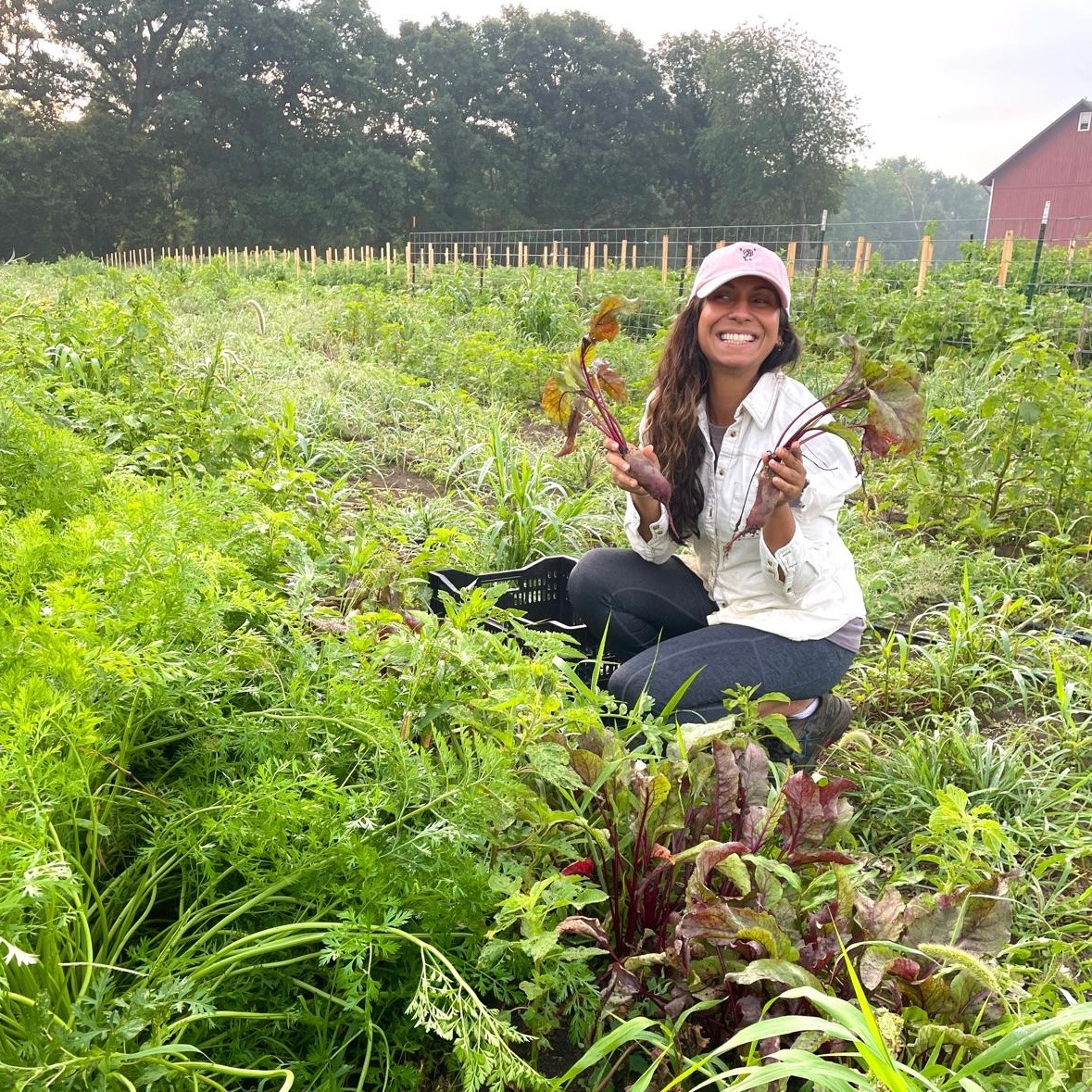A member of the Climate Land Leader’s Board of Directors, Rozina Kanchwala is an energy and environmental professional with global academic and field experience. Rozina founded Eco.Logic, a nonprofit that intertwines activism with the arts, and she is also a playwright. Read more about Rozina on our Board page.
Hot (Farm) Girl Summer by Rozina Kanchwala
Sweat dripped down my body under the blazing 90-degree sun. When I wiped my forehead with the back of my hand, sweat seeped into my eyeballs, stinging sharply. I finally stood up and felt the pressure in my lower back – I had been hunched over harvesting yellow wax beans for more than three hours.
“Water,” I thought only to realize I had left my water bottle at the end of the row. I looked up and saw I was maybe a third of the way done with the 200-foot row of beans. “This is how I wanted to spend my summer, right?” I asked myself, light-headed as I made my way toward my water bottle.
Earlier this year, my contract for DEI (Diversity, Equity, Inclusion) work ended, following the wider trend of companies, organizations, and federal programs pulling back from their DEI initiatives. Rather than search for a new job, I dove into producing Come Along for the Ride, a climate-themed play that explored climate grief through a dystopian lens where immigration, environmental collapse, and rising authoritarianism collide.
At the same time, I felt an urgency to do something more connected to the land.

Having studied sustainable food systems academically and up close in many countries – and often dreaming of living on an organic farm – I finally sought out hands-on experience. Farming doesn’t pay much, and despite that, it was hard to land a position. Eventually, I found a volunteer role on a small-scale organic farm. My shift was from 6am until 2pm and I would get paid in veggies. So began my hot (farm) girl summer.
What’s been weighing on me, and on so many, is the ongoing genocide in Gaza. More recently, the images of starvation: people reduced to skin and bones. Starvation is not a natural disaster — it is human-made and engineered. Genocides and holocausts have happened before, and are still happening, but this one has been documented in real-time, in high resolution, on social media and the news for the whole world to see. And still, the world hasn’t stopped it. The helplessness feels immobilizing. Calling elected officials feels naive. Donating feels like a drop in the ocean. But we do it anyway, hoping that something will shift, and that somehow, magically, the world powers will gain a conscience and stop the horrific madness.
This feeling was with me as I harvested those copious yellow beans. Meanwhile, the farm owner was making phone calls to local restaurants, trying to find takers for the abundance of cucumbers and beans that we couldn’t harvest fast enough. There was simply too much. Too much food. Too little justice. No one should be starving while farms–especially small, organic ones–struggle to distribute surplus produce.
When Big Agriculture and billionaires claim we need GMOs to feed the world’s growing population, they should spend the day on a small, organic farm. Hunger isn’t caused by lack of food; it’s caused by inequality and political choices. The reality is that it is small, diversified, organic farms that are the key to feeding the world. Small, diversified, organic farms are more resilient to climate change, better for soil and water, and more likely to nourish local communities. They aren’t just capable of feeding the world – they are essential to doing it sustainably and justly.
Sweltering heat is how I’d characterize summer of 2025, and it may be one of the cooler summers moving forward, as temperatures continue to rise. This has made my farming experience not just humbling, but eye-opening. I’ve gained deep appreciation for farmworkers, many of whom labor in dangerous heat, inhale wildfire smoke, and endure every element while growing and harvesting the food that sustains us.
A few weeks ago, I spent many hours weeding around onions. The weeds were nearly as tall as I am. It took everything in me to yank them out so the onion could grow uninhibited and chemical-free. Some point to how increased carbon dioxide and warmer weather can boost agricultural yields, but the truth is more complex: increased CO2 can also stimulate weed growth, reduce the nutritional quality of crops, and contribute to rising temperatures and climate instability — all of which make food production more challenging.
And then, in the not-so-distant background, there are reports of immigration raids. The farm I’m on is very small and employs a handful of people and volunteers, and feels removed from the larger-scale farms in places like California that often rely on immigrant labor. Still, I can’t help but wonder, “If ICE agents spent one day doing the work that farmworkers do, would they act with more compassion?” People are being rounded up, detained, treated inhumanely, and deported – sometimes their home countries, sometimes to unfamiliar places. And, often they are here because of political instability, climate challenges, and economic hardships – conditions that are, in many cases, linked to US policies and global systems in which the US plays a central role.
This summer of farming has taught me new things – about my body, about the land, about our food system, and about the people tied to our food. I already compost but reducing food waste has become even more important to me. I savor the taste of freshly picked, organic vegetables. I have a deeper appreciation for those who feed us, often invisibly. And I hold onto hope and a prayer: that the people of Gaza, and all who are food insecure and suffering, will receive the justice they deserve.
It’s been a hot, emotional, humbling summer. And I hope that soon, the heat will lift from the skies and from our collective conscience.